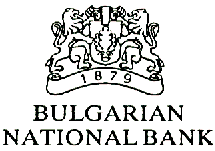
|

 BULGARIAN NATIONAL BANK BULGARIAN NATIONAL BANK
Contact:
1, Alexander Battenberg Square
1000 Sofia, Bulgaria
Phone:(+359 2) 987 4745 // 657 372 // 886 1200
Telex: (067) 24090 24091 BNB BG
Fax: (+359 2) 980 2425
|
 STRATEGY STRATEGY |

 Interview with Svetoslav Gavriiski Interview with Svetoslav Gavriiski
the Governor of the Bulgarian National Bank
Q: The Bulgarian financial system collapsed in 1996, 1997. Many banks went bankrupt, the exchange rate was the most important thing every morning. Do you think if now Bulgarian people and business trust the Bulgarian banks and Bulgarian lev?
A: Yes, it is true that in 1996 and the beginning of 1997 Bulgaria was in a deep financial crisis. At that time about 14 banks were closed. In March 1997, after the political reforms, Bulgaria concluded an agreement with the IMF and introduced a Currency Board. The present situation is completely different. We have achieved financial stability and a sound banking system. Bulgarian population has regained its trust in the lev and in the banking system, indicative of which is the rapid increase of bank deposits.
Q: Under the Currency Board regime Bulgarian National Bank is considered to be an institution with restricted power. Do you share such an opinion? Would you briefly describe the current role of BNB?
A: Yes, the Currency Board limits the activities of BNB. We think, however, that there are enough provisions to regulate the market and monitor the financial stability in the country. Pursuant to the Law on Bulgarian National Bank, we have three main departments - Issue Department, which is the currency board, Banking Department and Banking Supervision Department. These three departments conduct the policy of BNB, the main task being, in my opinion, strengthening the banking supervision and stabilising the banking system. According to the Law, BNB has no right to refinance the state nor the commercial banks, but it as well allows for BNB to function as a lender of last resort, in cases of commercial banks with temporary difficulties, in order to avoid a constant banking crisis.
Q: There are a lot of plans to privatise the state owned banks. Who would be the best investor according to your opinion?
A: The program of BNB and the Government is for privatising all Bulgarian state owned banks. Although they are only six, they own the major share in the banking system. With this regards, it is very important for us to accelerate the process. We do wish to attract steady partners, who by competing with Bulgarian banks, will considerably contribute to the improvement of the banking system. Our privatisation program anticipates all state owned banks to be privatised by the end of 1999. This process has already started with the privatisation of United Bulgarian Bank, as well as with the opening of procedures for the privatisation of Post Bank and Bulbank - the biggest and most stable Bulgarian bank. In my opinion, a good investor is the one, who is financially stable and has clear plans as to its future activity in Bulgaria.
Q: Now in Bulgaria there is a big discussion about the way the official interest rate of BNB is calculated. Would you describe what is the problem with the interest rate?
A: No, there is no problem with the interest rate.
After the financial crisis, when interest rates
reached 300%, we attained by financial stabilisation
an interest rate of 5.5%. There are some opinions,
that the rate is low considering the level of inflation
and the existing risk for investments in the country.
I would like to point out, however, that the basic
interest rate in Bulgaria is determined on an absolute
market basis, bounded in terms to the yield of the
quarterly government securities. Considering that
the Bulgarian lev is fixed to the German mark, interest
rates in lev deposits are approximately twice higher
than the deposits in German mark, as a result of
which, I believe, the interest rate is absolutely
normal. I think, that with the restructuring and
developing of the economy, when the commercial banks
will orient their efforts more to crediting the
economy, the demand for government securities will
decrease and opportune the increase of the interest
rate by 1-2 points. At present, there is a certain
discrepancy in respect of the supply and demand
of government securities, consequent to the good
liquidity of commercial banks and the good condition
of the state budget, which limits their emission. |
Q: Mr. Gavriiski, you are a specialist in relations with international financial institutions. Bulgaria has currently negotiated the EFF program with the IMF. What will this agreements secure for your country?
A: This is the first time that we complete successfully a stand by-agreement with the IMF and now we are negotiating the EFF program. The Bulgarian Government adopted a program for development of Bulgaria to 2001, and it is very important for us to have a clear view, as to whether this program will be supported by the international financial institutions. We expect this agreement to be signed in the autumn this year, the necessary financial support is also quite essential, as Bulgaria is severely indebted and its annual payment obligations are approximately USD 1 billion. In spite of the expected privatisation developments, as well as foreign investments and export increase, we are not in a position to fully serve our external obligations, which makes this financial support on behalf of the international financial institutions absolutely necessary. I would still like to emphasize, that the program with IMF by itself implies acknowledgement of the national stability in perspective and guarantees the economic and structural policy of the Government.
Q: Bulgaria wants to become a member of EU but also of NATO . When in your opinion your country will meet the financial criteria for that?
A: The achieved economic stability rapidly improved the macroeconomic indicators of the country, Bulgaria even at this stage meets some of the criteria for EU and EMU membership. In compliance with the Currency Board arrangements, the Bulgarian lev is fixed to the German mark, and it will be as well fixed to EURO from January 1, 1999. The financial stabilisation and economic reforms improved the condition of the state budget and we expect in the next several years to have a balanced budget, which would meet another of the criteria. Inflation for 1998 is expected to be approximately 10%, and according to the program, we shall meet the criteria for inflation rate at the beginning of next century. One of our major problems is the amount of our foreign debt, which makes about 100% of the GDP, but we count on 4-5% annual increase of GDP, on debt volume reduction, which makes us believe that in the beginning of next century we shall be able to meet the requirement of
60% foreign debt of the GDP. In general, Bulgaria will be in a position to comply with all economic criteria by the beginning of next century, when we hope the negotiations for membership will start.
Q: You have just said before that Bulgaria is ready to attract foreign investors concerning American companies. Lately an increasing number start to pay more attention to Bulgaria. Do you think that this will continue and what could be done to make the country more visible and attractive for the American business community?
A: I think Bulgaria has created a good foreign investment environment. The legislation provides protection of foreign investments and free movement of capital. By the end of
1998 Bulgaria will abolish all restrictions to the free movement of capitals, and will adopt full convertibility of the lev. The achieved financial stability and the continuing process of stabilisation in the next years, the program for economic restructuring and privatisation in the real sector and the banking system, provide good grounds for the expected increase of foreign investments in the country. I think Bulgaria may offer enterprises in sufficiently good condition for privatisation, participation in the telecommunications and other sectors, which would provoke the interest of the American business circles.
Q: Could you give to our readers a brief background of your own professional experience?
A: I started my professional career in 1972 at the Ministry of Finance, where I have worked for 25 years. My last seven years at the Ministry of Finance were as a vice minister and minister of finance. I have been a Governor of the Bulgarian National bank for one year now. My main obligations have been the relations with international financial circles, and I was a head of our delegation on the negotiations for settling our foreign debt obligations. As you know, we have reached an agreement on our foreign debt, which has certainly improved the attitude of the financial world toward Bulgaria and I hope I have contributed to some extent for this. For the last 7-8 years I have been governor and deputy governor for Bulgaria in the IMF, as well as in the World Bank , European Bank for Reconstruction and Development and European Investment Bank.
Q: What will be your final message to our readers?
A: First of all, I would like to wish all your readers many happy moments in their life. I think, Bulgaria chose the right way of development and I believe, that if your readers decide to visit our country, they will discover an attractive and steady country, that offers good conditions for business.
|
© World INvestment NEws, 1998.
This is the electronic edition of the special country report on Bulgaria
published in FORBES Magazine's
November 30th issue.
Developed by AgenciaE.Tv
| |
|
| |
| | | |
|
|

